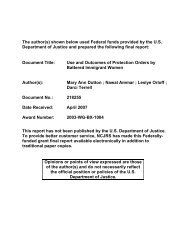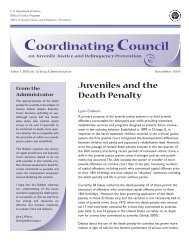Conflict Resolution Education - National Criminal Justice Reference ...
Conflict Resolution Education - National Criminal Justice Reference ...
Conflict Resolution Education - National Criminal Justice Reference ...
You also want an ePaper? Increase the reach of your titles
YUMPU automatically turns print PDFs into web optimized ePapers that Google loves.
<strong>Conflict</strong> resolution: A spectrum of processes that<br />
all utilize communication skills and creative thinking<br />
to develop voluntary solutions that are acceptable<br />
to those concerned in a dispute. <strong>Conflict</strong> resolution<br />
processes include negotiation (between two parties),<br />
mediation (involving a third-party process facilitator),<br />
and consensus decisionmaking (facilitated<br />
group problem solving).<br />
Consensus: An agreement reached by identifying<br />
the interests of all concerned parties and then<br />
building an integrative solution that maximizes<br />
satisfaction of as many of the interests as possible;<br />
a synthesis and blending of solutions.<br />
Consequence: A result that logically follows an<br />
action.<br />
Cooperation: Associating for mutual benefit;<br />
working toward a common end or purpose.<br />
Culture: That part of human interactions and experiences<br />
that determines how one feels, acts, and<br />
thinks. It is through one’s culture that one establishes<br />
standards for judging right from wrong, for<br />
determining beauty and truth, and for judging oneself<br />
and others. Culture includes one’s nationality,<br />
ethnicity, race, gender, sexual orientation, socioeconomic<br />
background, physical and mental ability,<br />
and age.<br />
Deescalate: To engage in actions that decrease the<br />
intensity of a conflict.<br />
Disputant: One who is engaged in a disagreement<br />
or conflict.<br />
Diversity: The fact or quality of being distinct.<br />
Empowerment: A method of balancing power in<br />
a relationship wherein the lower party acquires<br />
more power by gaining expertise, obtaining extra<br />
resources, building interpersonal linkages, and/or<br />
enhancing communication skills.<br />
Escalate: To engage in actions that increase the<br />
intensity of a conflict.<br />
Evaluation: The assessment of an option or possible<br />
conflict solution.<br />
D–2<br />
Facilitation: The use of a third party or parties to<br />
provide procedural assistance to a group attempting<br />
to reach consensus about a problem.<br />
Framing: The manner in which a conflict solution<br />
or issue is conceptualized or defined.<br />
Ground rule: A basic rule of behavior spelled out<br />
and agreed to at the beginning of a conflict resolution<br />
procedure.<br />
Hidden interest: A basic need or want that is not<br />
immediately evident in a conflict situation, but that<br />
must be recognized and addressed before meaningful<br />
dialog can occur.<br />
Integrative bargaining: The process of attempting<br />
to address and satisfy as many interests or needs as<br />
possible.<br />
Interest: A substantive, procedural, or psychological<br />
need of a party in a conflict situation; the aspect of<br />
something that makes it significant.<br />
Mediation: Intervention in a dispute by an impartial<br />
third party who can assist the disputants in negotiating<br />
an acceptable settlement.<br />
Mediator: An invited intervener in a dispute whose<br />
expertise and experience in conflict resolution techniques<br />
and processes are used to assist disputants<br />
in creating a satisfactory solution. The mediator is a<br />
process guide whose presence is acceptable to both<br />
disputants and who has no decisionmaking power<br />
concerning the issues in the dispute.<br />
Negotiation: An interaction between two or more<br />
parties who have an actual or perceived conflict of<br />
interest. In a negotiation, the participants join voluntarily<br />
in a dialog to educate each other about their<br />
needs and interests, to exchange information, and to<br />
create a solution that meets the needs of both parties.<br />
Option: An alternative course of action; a possible<br />
solution that may satisfy the interests of a party to<br />
a dispute.<br />
Peace: A process of responding to diversity and<br />
conflict with tolerance, imagination, and flexibility;<br />
fully exercising one’s responsibilities to ensure that<br />
all fully enjoy human rights.

















